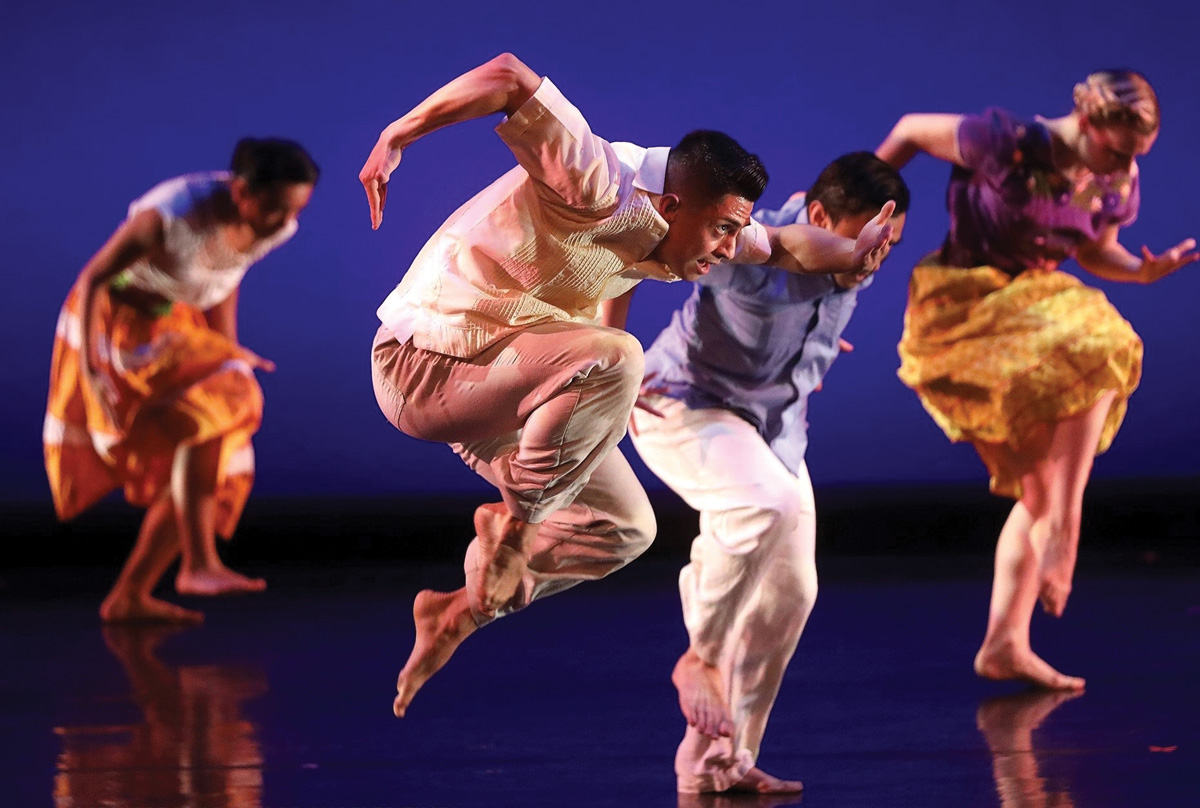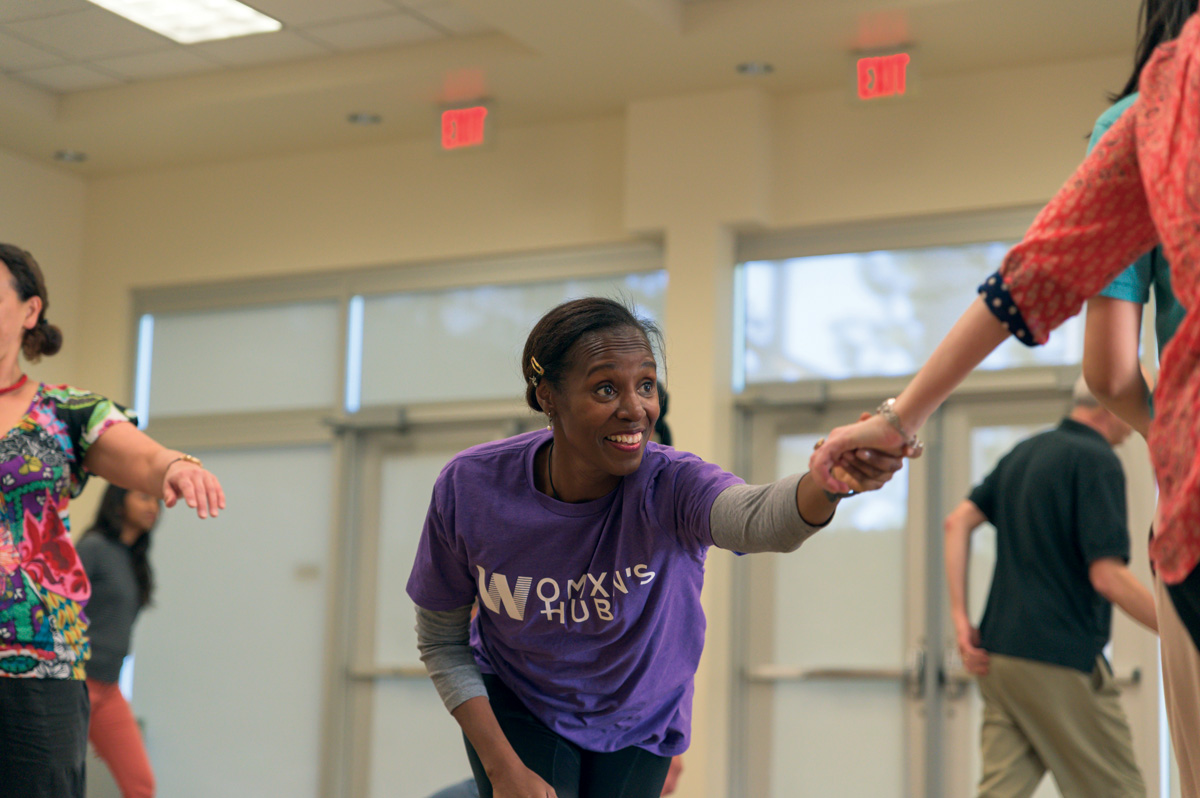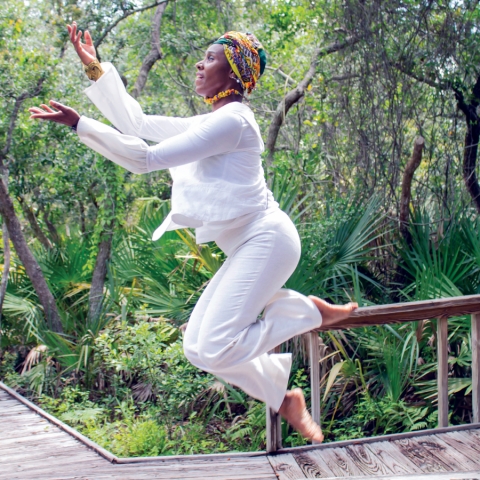Faculty Research: Embodying Humanity
What if dance could make us all better people? S. Ama Wray, associate professor of dance, believes it can.
“The world needs dance to connect with our bodies in terms of rhythm (since the constraints of time impact everything), and to connect with empathy to one another,” Wray says. “These things are innate with dance, and though they might sound trivial, these interstitial qualities in our humanity are sorely missing today.”
While her expertise in jazz and improvisation techniques makes her an internationally in-demand artist and scholar, Wray sees elements of her work applying to fields outside of dance. Through her nonprofit JazzXchange, she aims to use the principles of jazz performance to help people connect with their own creativity — and with each other.
Recently, Wray led a series of classes for the UCI community, teaching participants to use movement and patterned time to cope with the inevitability of mistakes and practice resilience. She says the participants, unknown to each other at the outset, came from all across campus and built a sense of community.
“It’s not about me imposing the movement,” she says, “but actually connecting others to a sense of time and possibility with each moment for themselves.” Movement, being present in our bodies at any given moment, is essential to our happiness, according to Wray.
“Our bodies are an extension of our minds,” she says. “If our bodies are repressed then we are only accessing a limited part of our human potential.”
Human potential
Edgar Aguirre ’19 learned street style dances growing up in the San Francisco Bay area. When he auditioned for the dance major at UCI, the well-honed technique of the other students left him intimidated. But then, he got to Wray’s portion of the audition, improvisation, where he shined. Engaging his mind and body with the rhythm of the moment? No problem.
"...they expand their horizons to see the ways in which dance can bring people together and create community."

Once in the dance program, Aguirre made up for his lack of formal training with lots of hard work and passion. He was soon part of the Etude Ensemble, the student dance troupe directed by the legendary choreographer Donald McKayle until his death in 2018. Not only did Aguirre learn McKayle’s celebrated works, but he experienced McKayle’s creative process as he developed new and socially relevant pieces.
“In a university setting like this, students see that it’s not only the stage they are engaging with. Many of them take classes in social sciences or even medicine, so in terms of them feeling connected to purpose in life, over time they expand their horizons to see the ways in which dance can bring people together and create community,” explains Wray. “Where students see those opportunities, they find purpose in them.”
Aguirre performed McKayle’s Crossing the Rubicon, Passing the Point of No Return, about the Syrian refugee crisis, and Uprooted Pero: Replantado, which examined the experience of immigrants crossing the U.S.-Mexico border. The latter was especially resonant for Aguirre, who emigrated from Guatemala when he was 5 years old.
“There’s a flow that you experience when dancing and covering such important and timely issues,” says Aguirre. “You have to allow your spirit to shine, and I was able to let go and just trust myself.” Aguirre’s artistry would eventually draw the attention of Cleo Parker Robinson, whose eponymous dance company includes several of McKayle’s pieces in its repertoire. When he graduated from UCI in 2019, Aguirre joined the company, where he is in the unique position of being able to continue the late choreographer’s legacy as they restage McKayle’s works.
Inspired to give
 Even as Aguirre flourished as a dancer at UCI, Wray encouraged him to explore outlets for his talent beyond the stage. “We all have multiple strands to our talents, and developing the awareness that your skills and knowledge can be received by different communities and can make a difference is very rewarding,” Wray says. Aguirre traveled to Panama City twice with UCI’s chapter of the national nonprofit Movement Exchange, to bring the joy of dance to local orphanages. He also taught dance classes at the University of Panama, gave a lecture on dance history specific to McKayle, and became the first person ever to teach McKayle’s choreography in the Central American country.
Even as Aguirre flourished as a dancer at UCI, Wray encouraged him to explore outlets for his talent beyond the stage. “We all have multiple strands to our talents, and developing the awareness that your skills and knowledge can be received by different communities and can make a difference is very rewarding,” Wray says. Aguirre traveled to Panama City twice with UCI’s chapter of the national nonprofit Movement Exchange, to bring the joy of dance to local orphanages. He also taught dance classes at the University of Panama, gave a lecture on dance history specific to McKayle, and became the first person ever to teach McKayle’s choreography in the Central American country.“It’s great to be in school learning about dance but also staying relevant to the world and our time,” says Aguirre. “I think that Mr. McKayle and Dr. Wray knew how to cultivate that in me.” At UCI, Aguirre also joined Shining Stars, a nonprofit run by UCI students who are mentored by Wray. The UCI students offer weeklong summer dance programs to Orange County elementary students who are otherwise unable to afford dance classes. On Monday, the children know virtually nothing about dance, but by Saturday, they are on stage at UCI performing ballet, tap, jazz and hip-hop routines for their families.
“I encourage our students to get involved and have these experiences because they grow, they learn about their own cultural values, they learn about respecting those of other people, and they learn what they have to give — when so often young people are often expected to largely be in that singular mode of receiving,” says Wray. As a professional dancer, Aguirre now visits elementary schools in cities where the company tours. It feels good, he says, to have something meaningful to offer young people — whether it’s teaching them dance or simply telling them to follow their own dreams. “Mr. McKayle was the light for me, and Dr. Wray was the one who was always pushing me to do more and more,” says Aguirre. “What drives all three of us is the spirit of humanitarianism.”
Please visit our secure direct giving page and make a gift to support Drance today!

